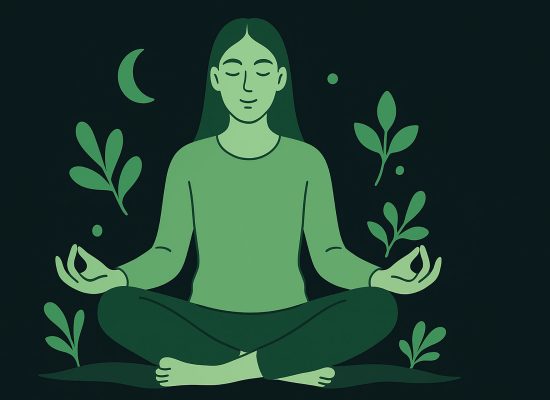Sleep is a basic human need. Improving your sleep and regulating your sleep routines overtime is a great way to take care of your physical and mental health and manage your busy schedule. A wonderful and proven way to sleep more soundly and fall asleep faster is to practice meditation as part of your nighttime routine. Meditation for sleep problems will make all the difference by allowing you to form a habit of meditation, a practice that will offer you the best sleep of your life. Siddha Meditate app offers Meditations for Better Sleep that use trusted techniques to prepare your mind and body for sleep.
Table Of Content
Why is it important to calm your mind before sleep?
When your mind is calm, you are better prepared for sleep. When your brain is relaxed you will fall asleep faster and minimize the number of times that you wake up in the night. Sleep hygiene is the process of developing healthy sleep habits that condition your environment and brain for the best possible night of sleep. Your sleep hygiene routine will be unique to you and your needs.
Some of the most common and important aspects of this habit include creating a calming bedroom space, establishing thoughtful relationships with both food and caffeine, exercising regularly, and relaxing your mind before bed. The best way to calm your mind as part of your sleep hygiene routine is to practice meditation. Siddha Meditate app offers meditations for sleep problems created by our team of expert instructors specifically designed with your sleep needs in mind!
How to induce sleep with meditation?
The important part of a sleep hygiene routine is that you practice your habit daily. When your sleep cycles are consistent, you will sleep better regardless of the stressors and anxieties that you encounter in your daily life. Sleep hygiene requires you to prepare your mind and environment for sleep hours before you fall asleep. Daytime habits are directly tied to your bedtime habits. When planning the timing of your bedtime meditation, you should schedule your practice for about 3 hours before you aim to fall asleep. .
Siddha Meditate app offers a scheduling feature so that you can map out your meditations to go to sleep and create a consistent bedtime. Incorporating meditation for insomnia into your routine can further enhance your ability to relax and drift off peacefully, making it an essential part of your sleep hygiene practice.
Meditation for sleep problems looks different for everyone. Many meditations for better sleep begin by asking you to find a comfortable position, such as on your bed or couch, either seated or lying comfortably on your back. In your meditation to go to sleep the instructor will ask you to close your eyes, which immediately reduces opportunities for distractions and allows your mind to focus on sleep preparations. From here, your instructor provides essential tips and practices to help calm the mind to prepare for sleep.
How to stop racing thoughts before sleep?
If you’ve been lying awake for 20 minutes or more, it’s time to reset. Get out of bed, drink warm water, and listen to something calming, like Siddha Meditate Relax Music, which can be found by selecting “Sleep” under our music header. Another great option is to incorporate meditation for insomnia in your routine which can help treat the sleep disorder with a long-term solution. Once you feel more relaxed by the gentle sound of the music or the calming voice of your meditation instructor, return to bed and try again—sometimes, a short break is needed or else you may end up feeling more anxious.
If you are new with Meditation for sleep problems, you can read “How to fall asleep fast?“
Can I meditate if I can’t sleep?
Yes! Meditations for sleep problems minimize the number of times that you will wake up in the night but also are there to help you if you do. Meditations, whether for any time of day or specifically designed for sleep, can help address issues like anxiety, depression, stress, or insomnia that may wake you during the night. There are even meditations for insomnia specifically designed with this condition in mind. Falling back to sleep can require different solutions for different nights, so having a range of plans to overcome sleeplessness can help you maximize your night of sleep.

8 tips to fall back asleep after waking in the night:
- Practice meditation for better sleep designed specifically for this problem! Siddha Meditate offers a class called Return to Sleep After Waking in the Night, in which our instructor, Amy Pattee Colvin, offers a visualization that helps your mind to break negative thought cycles and refocus on sleep.
- Limit distractions. While it can seem appealing to scroll on social media or watch some tv, it is important to help your mind calm down by centering your attention on your breath and falling back asleep.
- Journal about how you are feeling and about your intention to fall back to sleep. Setting an intention to sleep better can help your mind to concentrate on going back to sleep.
- Take a meditative walk around your room, house, or apartment. The gentle activity creates a healthy and unstimulating distraction that allows you to fall right back to sleep.
- Avoid bright lights. You may need to turn on a bedside lamp or even light a candle to write in your journal or read a peaceful book but try to avoid turning on a bright or overhead light which disturbs your circadian rhythm.
- Adjust the temperature in your bedroom. You may have woken up simply because your room got too hot or too cold, so make sure to reset or adjust it if you notice this issue.
- Focus on something boring. Counting sheep is a tested sleep technique for a reason! Also try counting your breaths, listing states, state capitals, or countries, or singing the alphabet song in your head.
- Visualize a beautiful natural landscape. Picture your favorite park, beach, forest, natural preserve or desert landscape and imagine the quiet and beauty of this space.
Focus on something boring. Counting sheep is a tested sleep technique for a reason! Also try counting your breaths, listing states, state capitals, or countries, or singing the alphabet song in your head.
How does meditation help sleep?
Meditation to go to sleep is effective because it directly addresses the root causes of sleep problems, such as overstimulation in the brain and our perception of this stimulation[1]. Meditation focuses our mind on the breath, limiting external distractions, and centering this essential sleeping function. Meditation for better sleep creates the basis for a sleep routine, creating a consistent pattern of great sleep and minimizing restless nights.

Meditation and sleep together: maximizing the brain boosting benefits
While meditation can improve your sleep, it can also make a world of difference on days following poor nights of sleep. Restful meditation can be a great way to reset and refresh the brain for the day ahead. This can make all the difference between stressful workdays, late nights of research or planning or even long travel days. Practicing meditation early in the morning or whenever your day starts prepares you to take on the day with a sense of focus and productivity that can be hard to gather otherwise.
In a nutshell…
This article explains solutions to prevent and get through restless nights to sleep. It provides an explanation for why meditation for sleep problems works at every level, as you are preparing for sleep, if you’re struggling to fall asleep and even if you wake up in the middle of the night! It provides information about what you should do if you wake in the night, how to form a sleep hygiene routine, and information about how meditation for better sleep works in the brain.
FAQ about Meditation for Insomnia
Does meditation help with sleep problems?
Yes, meditation for sleep problems is a proven method to improve sleep quality and regulate sleep routines. By calming your mind and body, meditation prepares you for restful nights, helping you manage daily stress and anxieties. Siddha Meditate app offers specialized meditations for better sleep, designed to guide you toward a consistent and refreshing sleep habit.
What is the best meditation for insomnia?
The best meditation for insomnia focuses on calming racing thoughts and preparing your body for sleep. Guided meditations like those on the Siddha Meditate app address the root causes of insomnia, such as stress and overactive thoughts, helping you fall asleep faster and stay asleep longer. These meditations are tailored to meet your unique sleep needs.
What are the benefits of meditation for sleep problems?
Meditation for sleep problems helps reduce anxiety, stress, and the number of times you wake up during the night. It creates a sense of calmness, improves sleep hygiene, and establishes a regular sleep cycle. Meditation for better sleep promotes overall mental and physical well-being.
Can meditation cure insomnia?
While meditation may not “cure” insomnia, it is a highly effective tool for managing the condition. Meditation for insomnia addresses the underlying causes, such as anxiety and stress, and helps create long-term habits for better sleep. Siddha Meditate’s guided classes are specifically designed to support those struggling with insomnia.
What is the best time to practice meditation for better sleep?
The ideal time for meditation for better sleep is about 3 hours before your intended bedtime. This allows your mind and body to wind down naturally. With Siddha Meditate’s scheduling feature, you can easily integrate meditation into your nightly routine for consistent and restful sleep.
How does meditation for insomnia differ from relaxation techniques?
Meditation for insomnia involves focused techniques like breathwork and mindfulness that directly address sleep challenges, while general relaxation may not always calm an overstimulated mind. Meditation is structured to guide your thoughts away from distractions, making it a more targeted approach to achieving restful sleep.
What are the common mistakes to avoid when practicing meditation to go to sleep?
Skipping meditation altogether or practicing inconsistently.
Using bright screens or engaging in stimulating activities right before meditation.
Rushing through the practice instead of focusing on the breath or guided instructions.
Trying meditation in a noisy or uncomfortable environment.
To avoid these mistakes, follow a structured routine with guided meditations for better sleep, like those offered on Siddha Meditate.







